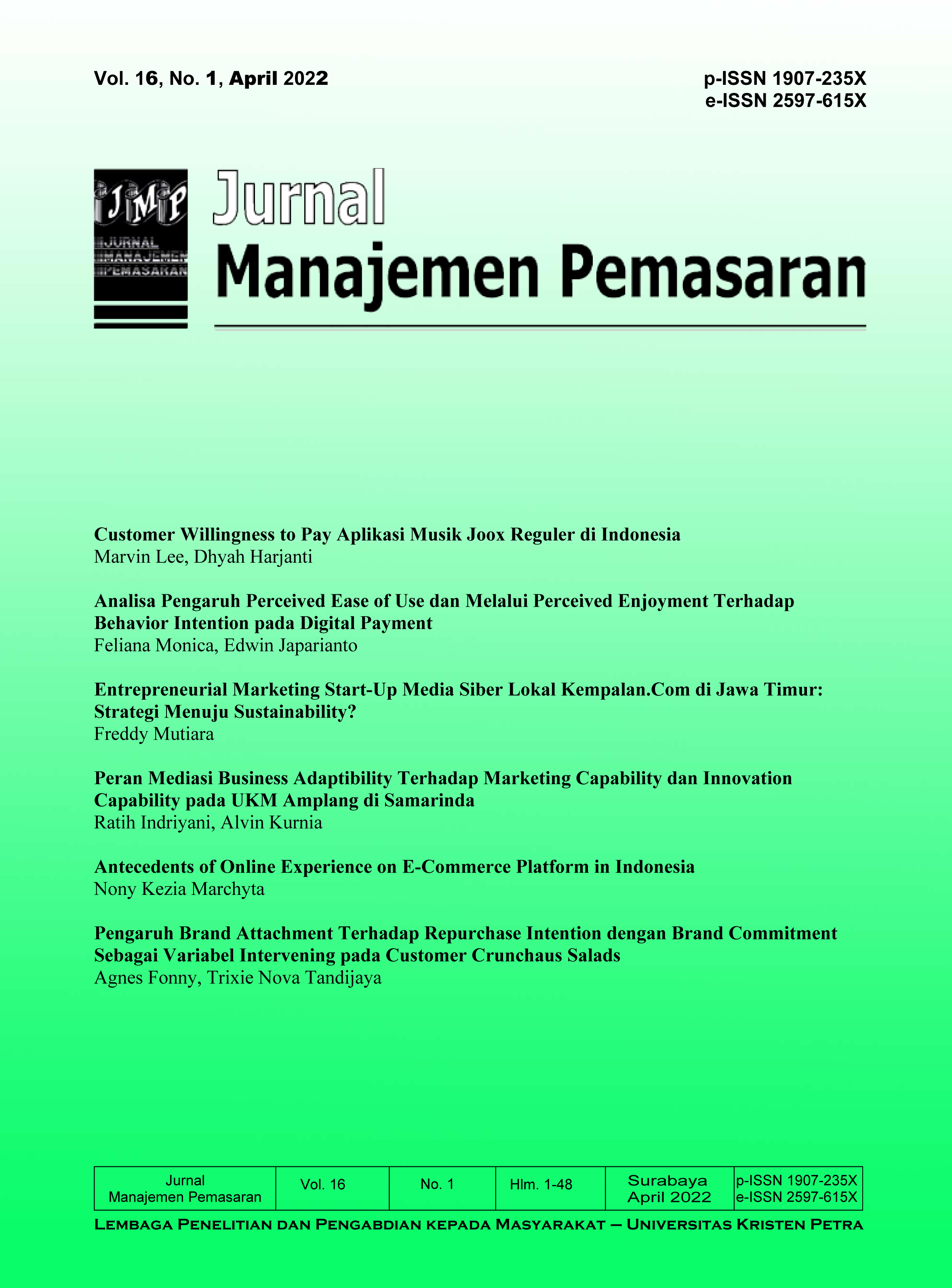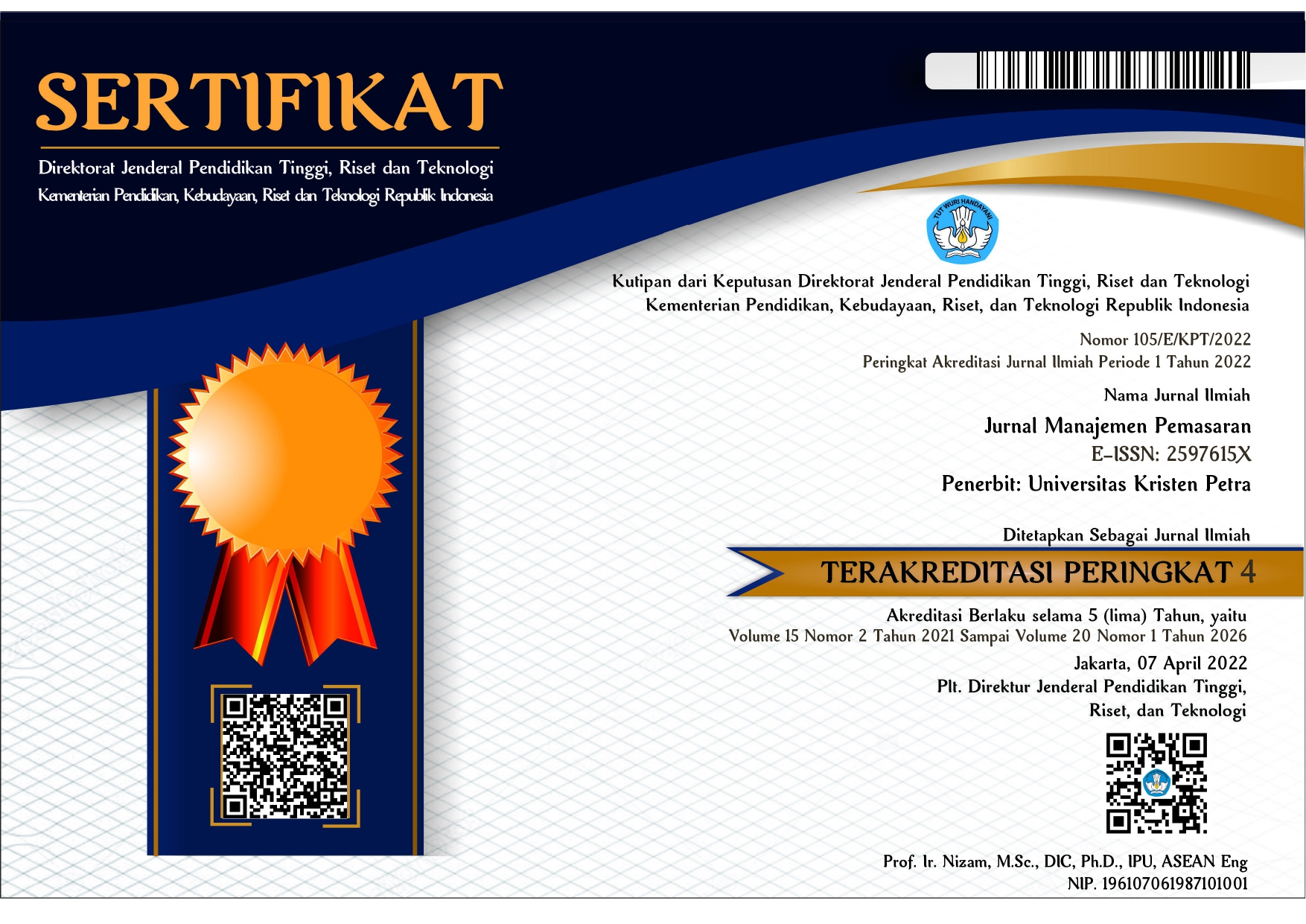PERAN MEDIASI BUSINESS ADAPTIBILITY TERHADAP MARKETING CAPABILITY DAN INNOVATION CAPABILITY PADA UKM AMPLANG DI SAMARINDA
DOI:
https://doi.org/10.9744/pemasaran.16.1.24-31Keywords:
Marketing capability, business adaptability, innovation capability, UKM AmplangAbstract
This study aims to observe the effect of marketing capability on innovation capability mediated by business adaptability with the research object of Amplang UKM in Samarinda. Amplang UKM is one of the most popular types of businesses in Samarinda and continues to grow. In this study, research data was obtained by distributing questionnaires to research respondents, namely the owners of Amplang SMEs in Samarinda collected as many as 100 respondents. The data obtained were then processed using data analysis techniques with the PLS model. The results show that marketing capability has an influence on business adaptability and innovation capability. This study also found that business adaptability has no effect on innovation capability. In this study it was also found that there was no mediating effect of business adaptability on the effect of marketing capability on innovation capability.
Abstrak:
Penelitian ini bertujuan untuk mengamati pengaruh dari marketing capability terhadap innovation capability yang dimediasi oleh business adaptability dengan obyek penelitian UKM Amplang di Samarinda. UKM Amplang merupakan salah satu jenis usaha yang populer di Samarinda dan terus berkembang. Dalam penelitian ini data penelitian diperoleh dengan penyebaran angket kepada responden penelitian yaitu pengelola UKM Amplang di Samarinda sebanyak 100 responden. Data yang diperoleh kemudian diolah menggunakan teknik analisis data dengan model PLS. Hasil penelitian menunjukkan bahwa marketing capability memiliki pengaruh terhadap business adaptability dan innovation capability. Dalam penelitian ini juga didapati bahwa business adaptability tidak berpengaruh terhadap innovation capability. Dalam penelitian ini juga ditemukan bahwa tidak terdapat pengaruh mediasi dari business adaptability terhadap pengaruh marketing capability terhadap innovation capability.
References
Ambec, S., Cohen, M.A., Elgie, S., & Lanoie, P. (2013). The Porter Hypothesis At 20: Can Environmental Regulation Enhance Innovation and Competitiveness? Review Environment Economy Policy, 7(1), 2–22.
Chiou, T.Y., Chan, H.K., Lettice, F., & Chong, S.H. (2011). The Influence of Greening the Suppliers and Green Innovation on Environmental Performance and Competitive Advantage in Taiwan. Transportation Research Economy Logistic. 47(1), 822–836.
Demil, B. & X. Lecocq. (2010). Business Model Evolution: In Search of Dynamic Consistency. Long Range Planning, 2 (43), 227-246
Di Valentin, C., Emrich, A., Werth, D., Loos, P., (2012). 'A Framework for Adaptive Business Models'. Proceedings of the International Confe-rence on Information Resources Management (Conf-IRM-12). Vienna: IGI Global.
Ganguly, Asim & Debdeep. (2019). Evaluating the Role of Social Capital, Tacit Knowledge Sharing, Knowledge Quality and Reciprocity in Deter-mining Innovation Capability of an Organization. Journal of Knowledge Management, 3(2), 45-55.
Lanoie, P., Laurent-Lucchetti, J., Johnstone, N., & Ambec, S. (2011). Environmental Policy, Inno-vation and Performance: New Insights on The Porter Hypothesis. Journal Economy Manage-ment Strategy, 20(3), 803–842
Mariadoss, B.J., Tansuhaj, P.S., & Mouri, N. (2011). Marketing Capabilities and Innovationbased Strategies for Environmental Sustainability: An Exploratory Investigation of B2Bfirms. International Marketing Management, 40(1), 1305–1318.
Mu, Jifeng. (2015). Markeciting Capability, Orga¬ni-zational Adaptation and New Product Develop-ment Performance. Industrial Marketing Mana-gement, 1(6), 7-19.
Rahman, S. & Probowati, B.D. (2014) Strategi Bersaing Oada Industri Kerupuk Amplang. Agrointek Volume 8, N0 2, 96 – 103.
Salvado, Gregorio & Jose. (2015). The Importance of The Complementarity Between Environmental Management Systems and Environmental Inno-vation Capabilities: A Firm Level Approach to Environmental and Business Performance. Tech-no¬logical Forecasting and Social Change, 9(6), 288-297.
Savitri, Nik, Jamaliah, Almasdi & Musfialdy. (2020). How Supply Chain Moderates the Relationship of Entrepreneurial Orientation, Adaptability Strategy and Government Interference with Perfor-mance? International Journal Supply Chain Management, 9(4), 30-40.
Song, M., Nason, R.W., & Benedetto, A.D. (2008). Distinctive Marketing and Information Technology Capabilities and Strategic Types: A Cross National Investigation. Journal International Marketing, 16 (1), 4–38.
Sugiyono. (2016). Metode Penelitian Kuantitatif, Kualitatif dan R & D. Bandung: CV Alfabeta.
Sultistyo & Siyamtinah. (2016). Innovation Capability of Smes Thrugh Entrepreneurship, Marketing Capability, Relational Capital and Empowerment. Asia Pacific Management Review, 3(2), 1-8.
Teece, D., Pisano, G., Shuen, A. (2010). Dynamic Capabilitie and Strategic Management. Strategy Management Journal, 18(7), 509–533.
Vorhies, D.W., & Morgan, N.A. (2005). Benchmark-ing Marketing Capabilities for Sustained Com-petitive Advantage. Journal Marketing, 69(1), 80–94
Yu, Ramakrishnan, & Prithwiraj. (2017). Environ-mental Pressure and Performance an Analysis of The Roles of Environmental Innovation Strategy and Marketing Capability. Technological Forecasting & Social Change, 1(10), 18-29

















